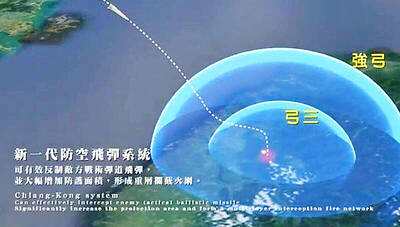The government is considering lodging a protest with Canada about the alleged maltreatment a Taiwanese woman received from Canadian immigration officials, Ministry of Foreign Affairs (MOFA) Spokesman Henry Chen (陳銘政) said yesterday.
Lee Chun-hua (李春華), 50, alleges she was forced to leave Canada on March 10 after being detained at Vancouver Airport for about six hours.
Lee wrote to MOFA Minister Timothy Yang (楊進添) on Sunday describing how she was allegedly maltreated by Canadian immigration officers and said she was forced to sign a document declaring that she wanted to leave the country or else face two to three days of detention pending further proceedings.
She said in the letter that immigration officers told her that her visa had expired, asked why she did not have a return ticket, why she had more than 10 pairs of underwear in her luggage and how she was able to afford the ticket. They confiscated her cellphone and notebook and refused to let her call her sister who was waiting for her in the airport lobby.
Displaying her mother’s visa, which does not expire until Sept. 7 and return ticket dated March 25 to TV reporters, Lee’s daughter asked the ministry to help her mother demand justice from the Canadian government for the maltreatment she suffered.
Chen said the ministry had asked the country’s representative offices in Ottawa and Vancouver to contact Canadian authorities to express the Taiwanese government’s “severe concern” over the matter and demand a clear explanation.
The representative offices have told the Canadian authorities that the incident had damaged the country’s image and hoped authorities would look into the matter.
If the allegations prove to be true, the ministry will protest to the Canadian government and demand an apology, Chen said.
The Canadian Trade Office in Taipei (CTOT), the official Canadian authority in Taiwan, said that Canada’s Privacy Act prohibits sharing an individual’s personal information with third parties.
“Canada welcomes millions of visitors from around the globe each year. Over 275,000 Temporary Resident Visas (TRVs) were issued to Taiwanese from 2005 through 2009. In the overwhelming majority of cases, the entry process is very smooth, “ the CTOT said.
MOFA urged Taiwanese nationals to call the toll-free international phone number 800-0885-0885 in case of emergency while traveling abroad.
ADDITIONAL REPORTING BY CNA

LIMITS: While China increases military pressure on Taiwan and expands its use of cognitive warfare, it is unwilling to target tech supply chains, the report said US and Taiwan military officials have warned that the Chinese People’s Liberation Army (PLA) could implement a blockade within “a matter of hours” and need only “minimal conversion time” prior to an attack on Taiwan, a report released on Tuesday by the US Senate’s China Economic and Security Review Commission said. “While there is no indication that China is planning an imminent attack, the United States and its allies and partners can no longer assume that a Taiwan contingency is a distant possibility for which they would have ample time to prepare,” it said. The commission made the comments in its annual

DETERMINATION: Beijing’s actions toward Tokyo have drawn international attention, but would likely bolster regional coordination and defense networks, the report said Japanese Prime Minister Sanae Takaichi’s administration is likely to prioritize security reforms and deterrence in the face of recent “hybrid” threats from China, the National Security Bureau (NSB) said. The bureau made the assessment in a written report to the Legislative Yuan ahead of an oral report and questions-and-answers session at the legislature’s Foreign Affairs and National Defense Committee tomorrow. The key points of Japan’s security reforms would be to reinforce security cooperation with the US, including enhancing defense deployment in the first island chain, pushing forward the integrated command and operations of the Japan Self-Defense Forces and US Forces Japan, as

INTERCEPTION: The 30km test ceiling shows that the CSIST is capable of producing missiles that could stop inbound missiles as they re-enter the atmosphere Recent missile tests by the Chungshan Institute of Science and Technology (CSIST) show that Taiwan’s missiles are capable of intercepting ballistic missiles as they re-enter the atmosphere and pose a significant deterrent to Chinese missile threats, former Hsiung Feng III missile development project chief engineer Chang Cheng (張誠) said yesterday. The military-affiliated institute has been conducting missile tests, believed to be related to Project Chiang Kung (強弓) at Pingtung County’s Jiupeng Military Base, with many tests deviating from past practices of setting restriction zones at “unlimited” and instead clearly stating a 30.48km range, Chang said. “Unlimited” restrictions zones for missile tests is

NO CHANGES: A Japanese spokesperson said that Tokyo remains consistent and open for dialogue, while Beijing has canceled diplomatic engagements A Japanese official blasted China’s claims that Japanese Prime Minister Sanae Takaichi has altered Japan’s position on a Taiwan crisis as “entirely baseless,” calling for more dialogue to stop ties between Asia’s top economies from spiraling. China vowed to take resolute self-defense against Japan if it “dared to intervene militarily in the Taiwan Strait” in a letter delivered Friday to the UN. “I’m aware of this letter,” said Maki Kobayashi, a senior Japanese government spokeswoman. “The claim our country has altered its position is entirely baseless,” she said on the sidelines of the G20 summit in Johannesburg on Saturday. The Chinese Ministry